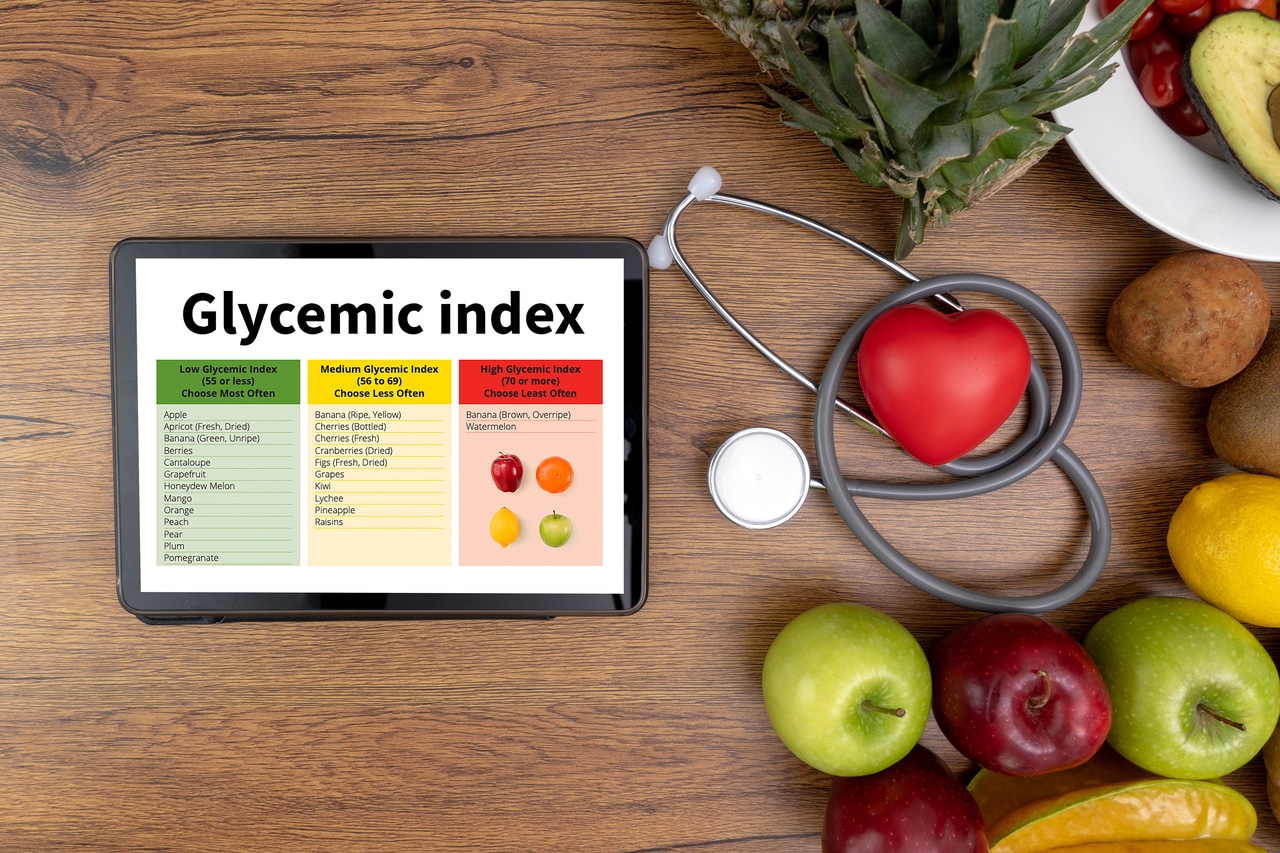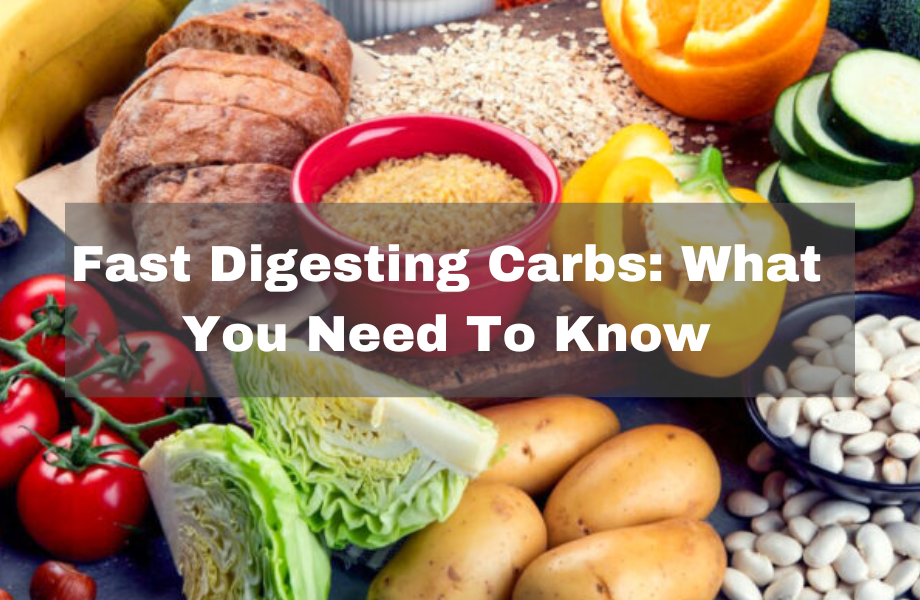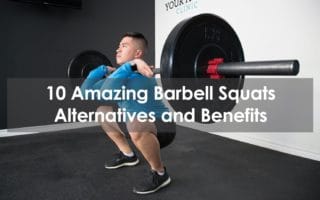Fast-digesting carbohydrates are well known to provide a quick energy rush. However, they can also lead to blood sugar spikes, resulting in binge eating and increased body fat. When used smartly, however, fast-acting carbs can actually enhance your workouts and help you achieve your training goals.
This article reveals how to use fast-digesting carbs to improve your body, not worse.
What is a Fast Digesting Carb?

Carbohydrates are one of three macro (or large) nutrients in food. The other two are protein and fat.
A fast-digesting carb is one that is easily digested by the body and converted into glucose or simple sugars. The glucose then travels through the bloodstream around the body.
Fast-digesting carbs provide a quick boost of energy to the body’s cells. they are constructed with slow-digesting carbs, which release glucose far more slowly. As a result, simple sugars do not increase blood glucose levels nearly as quickly as fast-digesting carbs.
You will experience a spike in blood sugar faster with high-glycemic foods than with low-glycemic ones. Fast-digesting carbohydrates are highly glycemic because of how quickly they cause an increase in blood glucose levels.
What is the Glycemic Index

According to how much they raise blood sugar levels after a meal, carbohydrates are ranked on a scale from zero to one hundred according to the Glycemic Index (GI). Blood sugar levels experience a rapid rise while eating meals with high glycemic carbs.
Even though fructose is much sweeter than table sugar (sucrose), it has a lower GI than sucrose with a slower release of sugar.
The glycemic index of carbohydrates is high for foods like sugar, sweets, white potatoes, and breakfast cereal. They produce a significant increase in both blood sugar and insulin levels by raising blood sugar levels fast.
Foods with a low glycemic index—like vegetables, legumes, nuts, unprocessed grains high in fiber, and nuts—don’t raise insulin levels or cause blood sugar levels to surge.
It’s crucial to keep these markers under control for better health, body weight, and energy levels.
To find out the glycemic index of the foods you eat, go here.
Timing Matters

When it comes to consuming fast-digesting carbs, it’s all about the timing. While you should minimize your intake of high glycemic carb count at other times of the day, you can indulge in a limited amount of fast-digesting carbohydrates immediately after an intense workout.
Your workout sessions are going to deplete your body of glycogen, which is your body’s main source of energy. When you consume fast-digesting carbs post-workout, the carbs will be converted to glucose and shuttled directly to your muscle cells in order to re-stock those supplies.
This contrasts with other times when the quick-digesting carbohydrates will go directly to fat storage.
An added benefit of consuming fast-acting carbs after your workout is that they will stimulate the release of insulin. This hormone has been shown to promote muscle growth.
Carb Timing Pre Workout
Athletes and regular exercisers now routinely time their carbohydrate intake. The goal of carb timing is to provide the body with the most fuel possible for it to function.
Carb cycling and carb backloading are the two methods of carb timing that are most frequently used. When athletes engage in carb cycling, they consume more carbohydrates on days when they engage in vigorous exercise and fewer carbohydrates on days when their energy requirements are lower.
Carb backloading entails delaying the majority of your daily carb intake and activity until later in the day. The theory behind this is that the body burns fat for energy throughout the day before replenishing the glycogen that was depleted during the workout.
What Are Some Good Post Workout Fast Digesting Carbs
The key to getting the maximum benefit from post-workout low glycemic index carbs and avoiding weight gain is to have them in a limited amount and to keep your consumption to a window of about an hour after your workout. You also need to be discerning about your form of carbohydrates.
Here are some examples of fast-acting low glycemic foods you can eat after your workout:
- White bread
- White rice
- Rice cakes
- Sweet potatoes
- Fruit juice
- Energy bars
- Potato chips
- White potato
- Greek Yogurt
- Sports drinks
- Brown sugar
- Jelly beans
Making Smart, Simple Carb Choices
Although there are many different types of quick-digesting carbohydrates, it’s vital to understand that not all are the same, and not all are the ideal choice for a post-workout snack.
The following criteria should be taken into account while selecting the ideal post-workout carbohydrates:
Low Fat & Fiber
The ideal choice for simple carbohydrates has less fiber and fat. They’ll reduce the rate at which carbs enter the bloodstream. You don’t want this post-workout because it will impede the insulin release needed to promote muscle growth.
Low-Medium Fructose Content
You don’t want to be taking in fructose immediately after a workout. The greater the fructose concentration, the greater the likelihood that it will be converted to glucose and used to replace liver glycogen stores rather than muscle glycogen stores.
Who Should Not Have Simple Carbs?

This question must be addressed individually, just like practically everything else in the realm of diet and fitness. This is due to the fact that each person’s body is unique, as are their health and fitness objectives and personal medical backgrounds.
If you are a diabetic you should not consume simple carbs after your workout, or at any time. People who are insulin resistant should likewise avoid simple carbohydrates.
If you are trying to lose weight, you should also minimize your simple carb intake.
Summary
Fast-digesting carbs are a type of carbohydrate that release simple sugars quickly to provide a quick energy boost. While simple sugars and fast-digesting carbs, which boost energy, should generally be avoided, you should have limited portions after your workouts. This will replace the glycogen that is sued up in the workouts and release insulin to promote muscle growth.
Some good simple carbohydrates are white bread, pasta, white rice, and fruit juice. In contrast, you can eat complex carbs at any time of the day.
Frequently Asked Questions
What is the difference between the type of carbohydrates in foods?
Complex carbs are released slowly into the bloodstream, whereas simple carbs contain simple sugars that quickly enter the bloodstream for a quick burst of energy. This rapidly increases blood glucose, which results in increased insulin production. You will experience an urge to eat more simple sugars as this blood glucose fluctuation kicks in.
When should I eat simple carbs?
The best time to eat simple sugars is directly after your workout. This will replenish the glycogen levels you have used up during the workout and promote muscle growth.
References
- Sharon N. Carbohydrates. Sci Am. 1980 Nov;243(5):90-116. doi: 10.1038/scientificamerican1180-90. PMID: 7423183.
- Arent SM, Cintineo HP, McFadden BA, Chandler AJ, Arent MA. Nutrient Timing: A Garage Door of Opportunity? Nutrients. 2020 Jun 30;12(7):1948. doi: 10.3390/nu12071948. PMID: 32629950; PMCID: PMC7400240.
- Marquet LA, Hausswirth C, Molle O, Hawley JA, Burke LM, Tiollier E, Brisswalter J. Periodization of Carbohydrate Intake: Short-Term Effect on Performance. Nutrients. 2016 Nov 25;8(12):755. doi: 10.3390/nu8120755. PMID: 27897989; PMCID: PMC5188410.







